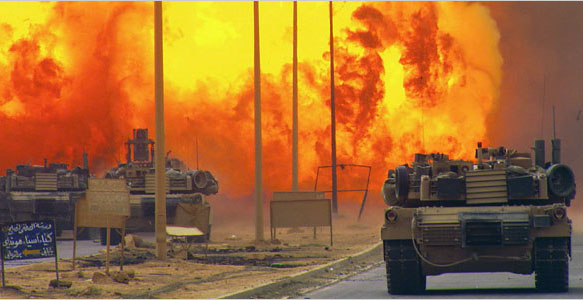The Iraq War was a protracted armed conflict that began with the 2003 invasion of Iraq led by the United States. The invasion toppled the government of Saddam Hussein. The conflict, however, continued for much of the next decade as an insurgency emerged to oppose the occupying forces and the post-invasion Iraqi government.
The invasion led to the collapse of the Ba’athist government; Saddam was captured in December 2003 and executed by a military court three years later. However, the power vacuum following Saddam’s demise and the mismanagement of the occupation led to widespread sectarian violence between Shias and Sunnis as well as a lengthy insurgency against U.S. and coalition forces.
The United States responded with a troop surge in 2007; the heavy American security presence and deals made between the occupying forces and Sunni militias reduced the level of violence. During 2002, U.S. President George Bush repeatedly warned of military action against Iraq unless inspections were allowed to progress unfettered.
In accordance with U.N. Security Council Resolution 1441 Iraq agreed to new inspections in late 2002. With the cooperation of the Iraqis, a third weapons inspection team in 2003 led by David Kelly viewed and photographed two alleged mobile weapons laboratories, which were actually facilities for the production of hydrogen gas to fill balloons.

A meeting between George W. Bush and Tony Blair took place on 31 January 2003, in the White House. A secret memo of this meeting purportedly showed that the Bush administration had already decided on the invasion of Iraq at that point.
Bush was allegedly floating the idea of painting a U 2 spyplane in UN colours and letting it fly low over Iraq to provoke Iraqi forces into shooting it down, thereby providing a pretext for the United States and Britain to invade.
Bush and Blair made a secret deal to carry out the invasion regardless of whether WMD were discovered by UN weapons inspectors, in direct contradiction with statements Blair made to the British House of Commons afterwards that the Iraqi regime would be given a final chance to disarm.
In the memo, Bush is paraphrased as saying, “The start date for the military campaign was now pencilled in for 10 March. In June 2010, as the Afghanistan War rivalled the Vietnam War as the longest in U.S. history and as American war deaths there topped the 1,000 mark, the president was faced with another challenge when Gen.
Stanley McChrystal, commander of NATO-U.S. forces in Afghanistan, and members of his staff made derisive comments about top Obama administration officials to a reporter from Rolling Stone magazine.
Obama relieved McChrystal of command, replacing him with Gen. David Petraeus, who had been responsible for the surge strategy in Iraq. In August, on schedule, the U.S. combat mission in Iraq came to a close; though 50,000 American troops remained, the majority of U.S. forces had been withdrawn.
Many columnists and political cartoonists were quick to see parallels between the potential pitfalls prolonged involvement in Afghanistan held for Obama’s ambitious plans for social legislation and the way in which the Vietnam War had undermined Pres. Lyndon B. Johnson’s efforts to build the Great Society.